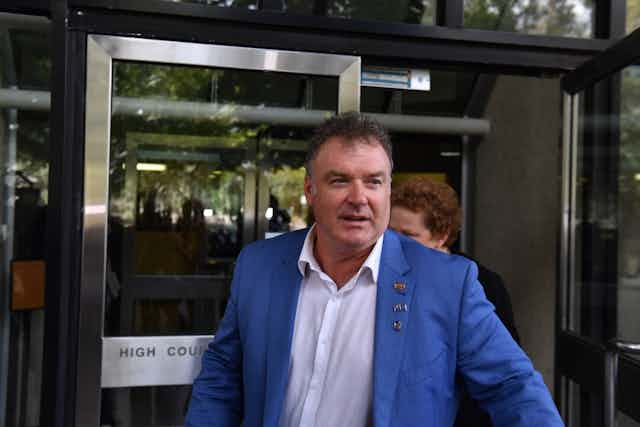The High Court on Friday put a decisive end to the debate over the eligibility of Rod Culleton to serve as a senator for Western Australia. It held unanimously that he was incapable of being chosen as a senator under Section 44(ii) of the Constitution.
There have been questions surrounding Culleton’s eligibility since before he was even elected. This culminated last November, when the Senate referred the question of his eligibility to the High Court, sitting as the Court of Disputed Returns.
Throughout all of these legal controversies Culleton has continued to insist he remains a validly elected senator.
What was the court asked to decide?
The Court of Disputed Returns was asked to consider the constitutional impact of Culleton’s earlier conviction in New South Wales for larceny.
Culleton was convicted in March 2016. However, this conviction was subsequently appealed and annulled – after he had been elected to the Senate. While he later pleaded guilty to the same charge, no conviction was ultimately recorded.
The potential constitutional impact of this conviction stems from Section 44(ii). This states a person is incapable of being chosen as a senator if they have:
… been convicted and is under sentence, or subject to be sentenced, for any offence punishable under the law of the Commonwealth or of a state by imprisonment for one year or longer.
Although Culleton wasn’t actually sentenced to imprisonment, the charge itself attracts a maximum penalty greater than imprisonment for one year. This is enough to have potentially rendered him ineligible under Section 44(ii) at the time of the election in 2016.
The question before the Court of Disputed Returns was therefore a narrow one. Did Section 44(ii) disqualify somebody who is caught by the provision at the time of being elected, but whose conviction is subsequently annulled?
In essence, Culleton’s parliamentary career turned on the meaning of the word “annulment”.
What did the court decide?
The court held that Culleton was disqualified under Section 44(ii) at the date of the 2016 election, both as a matter of fact and as a matter of law. It unanimously held that the subsequent annulment of this conviction did not change that conclusion.
As a result, the court declared there is a vacancy in WA’s representation in the Senate for the place for which Culleton had been returned.
The court’s key finding was that the annulment on August 8, 2016, was only capable of operating prospectively – meaning the conviction was not avoided in its entirety by the annulment.
The court did note that in some contexts (for example, in family law) an annulment may have retrospective effect, but this depends ultimately on the statutory context in which the term is used.
In this case, the relevant legislation was the NSW Crimes (Appeal and Review) Act. The court held that a conviction annulled under this act is annulled only for the future, and that:
… these provisions do not purport to operate retroactively to deny legal effect to a conviction from the time that it was recorded.
What happens next?
The most immediate effect of this ruling is that it is now beyond doubt that Culleton is no longer a senator – and, indeed, was never eligible to be elected as a senator in the first place.
This does not spell the end of the legal troubles Culleton faces. He is appealing a bankruptcy order issued by the Federal Court last December, and faces a stealing trial in Perth later this year.
However, following the Court of Disputed Returns’ ruling, none of these legal issues will have any further bearing on the question of whether he is able to continue as a senator. The decision on that point was decisive and final.
Senate President Stephen Parry has previously advised the WA government that while there was a vacancy in the state’s representation, it would be necessary to wait for the Court of Disputed Returns’ decision before it became apparent how the vacancy should actually be filled.
The court has now made that clear. It has held that the vacancy should be filled by a special count of the ballot papers. The court specifically noted that it is not necessary to order a new poll, either for the vacant position itself or for all 12 of WA’s Senate positions.
Essentially, this means a recount of the WA Senate ballot papers from the 2016 election will occur. This means the group ticket votes received by Pauline Hanson’s One Nation that were initially allocated to Culleton will be transferred instead to the party’s second candidate, Culleton’s brother-in-law Peter Georgiou.
The court expressly noted in its judgment that this recount process “would not distort the true legal intent of the voters”, given that 96.04% of the votes Culleton received were actually above-the-line votes for One Nation.
Therefore, the almost-certain outcome of the recount that has been ordered is that Georgiou will be declared elected as the new WA senator. Pauline Hanson has already suggested that Georgiou will take his seat as part of her One Nation team.
This means that, after all of the legal controversies of the past year, we have ended up in essentially the same position – the Senate will include a One Nation senator from WA. The only difference is that it won’t be Rod Culleton.

